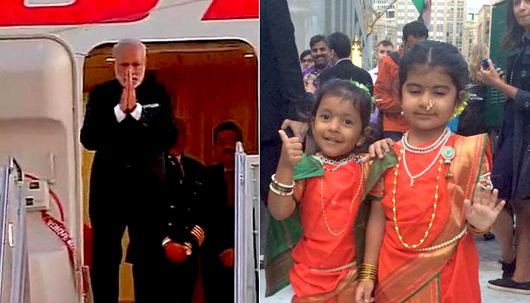New York, Sep 24: Prime Minister Narendra Modi arrived here today on a five-day US visit, his second in as many years, during which he will address world leaders at a landmark UN sustainable development summit and interact with top CEOs and the Indian diaspora in Silicon Valley.
Modi will have a packed agenda for the next two days in the city and then in California from September 26-27.
The Prime Minister was received at the airport by Indian Ambassador Arun K Singh, India's envoy to the UN Asoke Mukerji, Consul General Dnyaneshwar Mulay and their spouses.
Modi will return to New York on September 28 for a bilateral meeting with President Barack Obama as well as to attend a high-level peacekeeping summit at the United Nations.
On Friday, he will address global heads of state at the Sustainable Development Summit hosted by UN Secretary General Ban Ki-moon when the new and ambitious post-2015 development agenda will be adopted.
India will also host the G-4 summit here on September 26, before Modi leaves for the West Coast for a packed two-day trip during when he will have meetings with Facebook CEO Mark Zuckerberg, Apple CEO Tim Cook and Google's new CEO Sundar Pichai. He will also attend a grand community reception in San Jose.
Modi will also meet President Barack Obama on September 28, his third summit meeting with the President in about a year. Modi is expected to focus on giving a further push to early and urgent reform of the Security Council and to send an "unambiguous message" of "zero tolerance against terrorism".
In a letter to the UN Secretary General in July, Modi had said that that the UN must be made more effective for dealing with new security challenges as "we are now living in an era when non-state military actors are a major factor."
"We must use this historic year to jointly send an unambiguous message of zero tolerance against terrorism. An important step in this direction would be adopting the Comprehensive Convention against International Terrorism at the United Nations this year," Modi had written in the letter.
India's Permanent Representative to the UN Asoke Mukerji has said that the Prime Minister's speech at the Sustainable Development summit will focus on "Agenda 2030" since he "has given a lot of attention to the substance of the development agenda."
Among the ambitious 17 goals to be adopted by the UN for the next 15 years is complete poverty eradication, zero hunger, quality education, gender equality, sustainable cities and communities and clean water and sanitation.
In his letter to the UN Chief, Modi had also underscored that eliminating poverty by 2030 should "unquestionably" be at the heart of the post-2015 Development Agenda.
"The most acute forms of poverty still remain the most pressing problem and require direct, urgent and sustained interventions. Addressing the needs, concerns and human rights of 1.3 billion poor people in the world is not merely a question of their survival and dignity, but also a vital necessity for an enduring peaceful, sustainable and just international order," he said.
The post-2015 Development Agenda should ensure that no one is left behind and "we must rekindle the strength of international support and partnership that had characterised some of our social missions in the past for tackling poverty," he had said.
At the Waldorf Astoria hotel, a large number of BJP supporters gathered waiting to welcome the Prime Minister.






Comments
Add new comment